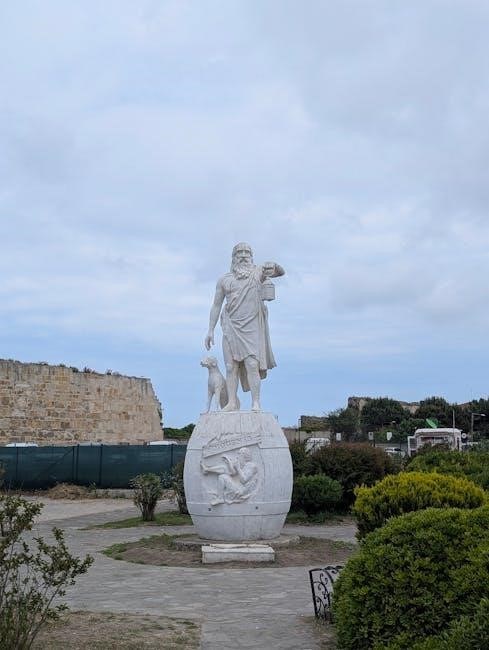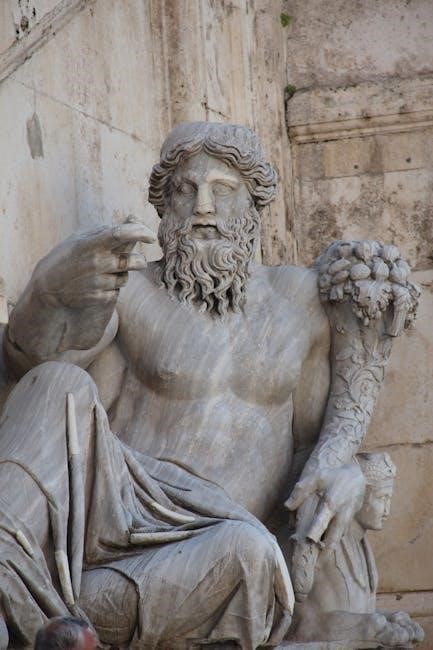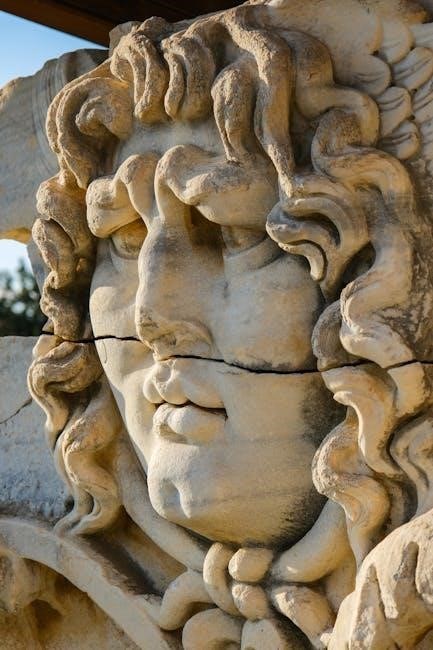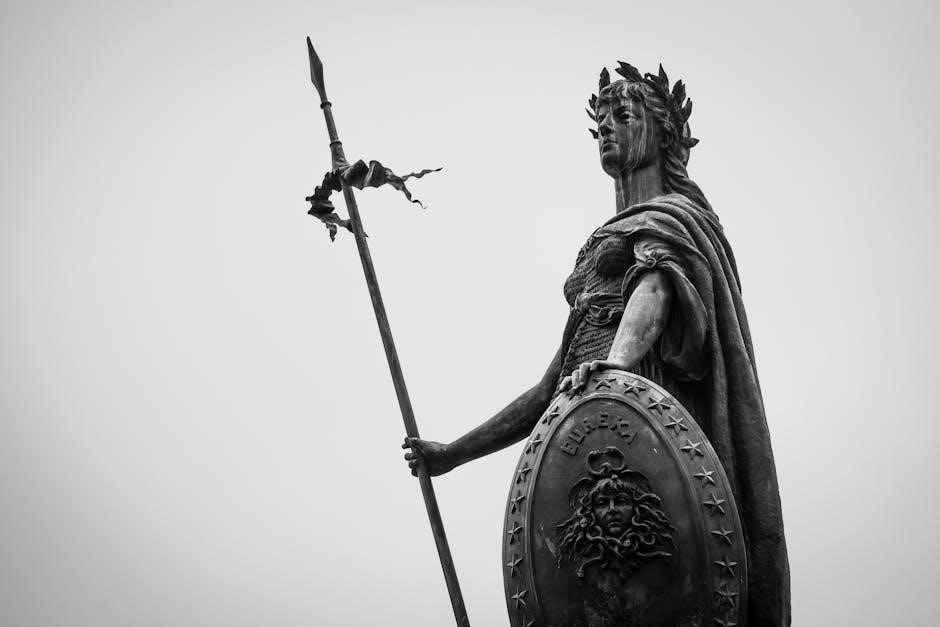
Percy Jackson’s Greek Gods offers an engaging introduction to Greek mythology, blending humor and adventure. The PDF version serves as a popular guide, making mythological tales accessible and entertaining for readers worldwide.
1.1 Overview of Percy Jackson’s Greek Gods
Percy Jackson’s Greek Gods, authored by Rick Riordan, is a captivating retelling of Greek mythology. The PDF version, published by Ayushi Chaturvedi in 2022, offers a modern twist, blending humor and adventure. This guide introduces readers to iconic deities like Zeus, Poseidon, and Hera, presenting their stories in an engaging, accessible format. Aimed at younger audiences, it simplifies complex myths while maintaining their essence. The book serves as a bridge between classical mythology and contemporary storytelling, making it a popular resource for both fans of Percy Jackson and newcomers to Greek mythology. Its availability in PDF format has further expanded its reach, allowing readers to explore these timeless tales with ease.
1.2 The Significance of Greek Mythology in Percy Jackson’s Universe
Greek mythology serves as the foundation of Percy Jackson’s universe, shaping its world, characters, and themes. It provides the historical and cultural context that defines the lives of demigods and gods alike. The myths are intricately woven into the plot, influencing quests and character development; They explore universal themes like heroism, fate, and identity, resonating deeply with readers. By reimagining these ancient stories, Rick Riordan bridges the gap between classical mythology and modern audiences. The availability of Percy Jackson’s Greek Gods in PDF has made this enriching experience more accessible, ensuring the timeless appeal of Greek mythology endures for new generations.
1.3 Why Percy Jackson’s Greek Gods is a Popular Resource
Percy Jackson’s Greek Gods has become a beloved resource due to its unique blend of humor and authenticity. Rick Riordan masterfully retells classic myths with a modern twist, making them relatable and entertaining for contemporary readers. The book’s engaging narrative style appeals to both young readers and adults, fostering a deeper appreciation for Greek mythology. Additionally, the availability of the Percy Jackson’s Greek Gods PDF ensures easy access, allowing readers to explore these captivating stories anytime, anywhere. Its educational value is also significant, making it a cherished resource for mythology enthusiasts and educators alike.

The Greek Gods in Percy Jackson’s World
The Greek gods in Percy Jackson’s world are central to the narrative, influencing quests and character development while blending myth with modern life seamlessly.
2.1 The Olympian Gods and Their Roles
The Olympian gods in Percy Jackson’s world are powerful, immortal beings residing on Mount Olympus, each with distinct roles. Zeus, as king, controls the skies and enforces order, while Poseidon rules the seas and Athena embodies wisdom. These gods often intervene in mortal affairs, shaping the lives of demigods. Their personalities and rivalries drive the plot, with Hera’s protectiveness of marriage and Ares’ love for war creating tension. Their roles extend beyond mythology, influencing quests, prophecies, and the balance of power. The Olympians’ interactions with Percy and other demigods highlight themes of destiny, responsibility, and the complexities of divine authority. Their modern interpretations make them relatable yet formidable figures in the narrative.
2.2 The Titans and Their Relevance to Percy Jackson
The Titans, powerful primordial deities, play a significant role in Percy Jackson’s world, embodying chaos and rebellion against the Olympian order. Led by Kronos, they seek to overthrow Zeus and reclaim dominance. Their resurgence in Percy’s adventures escalates tensions, as they aim to destroy the modern world’s stability. Kronos’s return and his manipulation of demigods highlight the eternal struggle between order and chaos. The Titans’ schemes directly threaten Percy and his friends, forcing them to confront ancient adversaries and their legacy. This conflict underscores themes of destiny, sacrifice, and the enduring battle between old and new powers, central to the series’ narrative.
2.3 The Heroes of Greek Mythology in Percy Jackson’s Stories

Greek mythology’s iconic heroes, such as Hercules, Theseus, and Perseus, are reimagined in Percy Jackson’s world, where their legacies shape the demigod experience. Percy and his friends often draw inspiration from these heroes’ bravery and ingenuity. However, the stories also highlight the flaws and humanity of these legendary figures, making them relatable to modern readers; Percy’s own journey mirrors the hero’s quest archetype, blending ancient myths with contemporary challenges. The heroes’ stories serve as both motivation and cautionary tales, emphasizing the importance of courage, loyalty, and sacrifice. This fusion of classic and modern heroism enriches the narrative, making Greek mythology accessible and engaging for young audiences.
Major Greek Gods Featured in Percy Jackson
The series highlights Olympian gods like Zeus, Poseidon, and Hades, along with Athena, Ares, and Dionysus, showcasing their distinct powers and personalities in Percy’s adventures.
3.1 Zeus: The King of the Gods
Zeus, the mighty king of the gods, reigns supreme in Percy Jackson’s world. As the ruler of Mount Olympus, he wields unparalleled power, controlling the skies and lightning bolts. Known for his authoritative and often stern demeanor, Zeus is deeply respected and feared by both gods and demigods. His role in Percy’s adventures is significant, as his decisions often shape the fate of quests and battles. Despite his intimidating presence, Zeus’s leadership and commitment to justice are central to maintaining balance in the universe. In Percy Jackson’s Greek Gods, Zeus’s stories reveal his complex character, from his rise to power to his role in famous myths.
3.2 Poseidon: The God of the Sea
Poseidon, the powerful god of the sea, plays a pivotal role in Percy Jackson’s world. As the ruler of the oceans, he commands immense power, controlling tides and earthquakes with his trident. In Percy Jackson’s Greek Gods, Poseidon’s stories highlight his strength and influence. His relationship with Percy, as his father, adds depth to his character, showcasing his protective and caring side. Despite his authority, Poseidon often faces challenges, balancing his duties as a god with his love for his demigod son. His role in Percy’s adventures underscores his importance in maintaining the balance of power in the universe.
3.3 Hades: The God of the Underworld

Hades, the god of the underworld, is often misunderstood in Percy Jackson’s universe. Known for ruling the dead, he is frequently portrayed as stern and intimidating. In Percy Jackson’s Greek Gods, Hades’ complexities are explored, revealing a ruler who is both fair and burdened by his duties. His iconic helmet of darkness and keys to the underworld symbolize his power. Hades’ interactions with Percy highlight his role as a protective father to Nico and Bianca di Angelo, showcasing a deeper, more human side. Despite his fearsome reputation, Hades plays a crucial role in maintaining balance in the universe, often aiding Percy in unexpected ways.
3.4 Hera: The Queen of the Gods
Hera, as the queen of the gods, holds a pivotal role in Percy Jackson’s universe. Known as the goddess of marriage and family, she is often depicted as powerful yet stern. In Percy Jackson’s Greek Gods, Hera’s protective nature and strong sense of justice are highlighted, though her strict adherence to tradition sometimes leads to tension. Her relationship with Zeus and her stepmotherly treatment of demigods like Percy showcase her complex personality. Despite her harsh demeanor, Hera’s influence is undeniable, often shaping the fate of heroes and the balance of power among the gods. Her role underscores the intricate dynamics of Olympian politics and family ties.
3.5 Demeter: The Goddess of Agriculture
Demeter, the goddess of agriculture and fertility, plays a vital role in Percy Jackson’s Greek mythology. She is often depicted as nurturing and kind, deeply connected to the earth and its bounty. In Percy Jackson’s Greek Gods, Demeter’s story highlights her maternal devotion, particularly through her search for her daughter Persephone. Her influence over the changing seasons reflects her emotional journey, showcasing her power and significance. While she may not be as directly involved in Percy’s adventures as other gods, her role in sustaining life and fertility underscores her importance in the Olympian pantheon and the natural world.
3.6 Athena: The Goddess of Wisdom

Athena, the goddess of wisdom, warfare, and crafts, is a central figure in Percy Jackson’s Greek mythology. Known for her intelligence and strategic thinking, she often serves as a mentor to heroes, guiding them through challenges. In Percy Jackson’s Greek Gods, Athena’s wisdom and leadership are highlighted, showcasing her role as a powerful and respected deity. Her rivalry with Ares contrasts her preference for strategy over brute force. As the mother of Annabeth Chase, Athena’s influence extends to Percy’s adventures, emphasizing the importance of cleverness and bravery. Her presence underscores the value of wisdom in overcoming adversity.
3.7 Apollo: The God of the Sun and Music
Apollo, the radiant god of the sun, music, poetry, and prophecy, is a pivotal figure in Greek mythology. In Percy Jackson’s Greek Gods, Apollo’s charisma and artistic talents are emphasized, as well as his role as the leader of the Muses. His iconic lyre symbolizes his connection to music and creativity. Apollo’s dual role as a healer and a god of prophecy further highlights his importance. In Percy Jackson’s universe, Apollo’s interactions with demigods and his occasional mortality add depth to his character. His stories blend glory and vulnerability, making him a compelling and relatable deity in both myth and modern adaptations.
3.8 Artemis: The Goddess of the Hunt
Artemis, the goddess of the hunt, wilderness, and the moon, is a central figure in Greek mythology. In Percy Jackson’s Greek Gods, she is portrayed as a strong, independent deity who embodies the spirit of the wild. Artemis is often depicted with her silver bow and arrows, symbolizing her precision and skill. As the protector of young girls and the patron of chastity, she represents purity and resilience. Her close relationship with her twin brother Apollo highlights their shared qualities, yet her fierce independence sets her apart. Artemis’s stories in the book showcase her unwavering dedication to her domain and her unyielding connection to nature.
3.9 Ares: The God of War
Ares, the god of war, is one of the most fearsome deities in Greek mythology. In Percy Jackson’s Greek Gods, Ares is depicted as brutal, bloodthirsty, and often disliked by both gods and mortals; Unlike Athena, who represents strategic warfare, Ares embodies the chaotic and violent aspects of battle. His symbols, such as the spear and wild dogs, reflect his savage nature. Ares is also known for his numerous affairs and children, many of whom become powerful warriors. Despite his fearsome reputation, Ares is often portrayed as cowardly and impulsive, making him a complex and intriguing figure in Percy Jackson’s retelling of Greek myths.
3.10 Aphrodite: The Goddess of Love
Aphrodite, the goddess of love and beauty, is a central figure in Greek mythology. In Percy Jackson’s Greek Gods, she is portrayed as vain and self-absorbed, often more concerned with her appearance than genuine love. Her powers are immense, as she can inspire passion and desire in both mortals and gods. Aphrodite is married to Hephaestus but is infamous for her many affairs, including with Ares. Her children, such as Eros (Cupid), play significant roles in the myths. Despite her flaws, Aphrodite’s influence is undeniable, shaping the fates of heroes and gods alike. Her character adds depth to Percy Jackson’s retelling, highlighting the complexity of love in Greek mythology.
3.11 Hephaestus: The God of Fire and Forge
Hephaestus, the god of fire and the forge, is a unique figure in Greek mythology. Known for his exceptional craftsmanship, he crafts magnificent weapons and armor for the gods. Despite being physically disabled, Hephaestus is revered for his intellect and creativity. In Percy Jackson’s Greek Gods, he is often depicted as the blacksmith of the gods, creating iconic items like Achilles’ armor. His marriage to Aphrodite, despite her infidelity, highlights his resilience. Hephaestus’ role in Percy Jackson’s world showcases his importance as a problem-solver and inventor, proving that true power lies in wisdom and skill rather than physical perfection.
3.12 Hermes: The Messenger of the Gods
Hermes, the swift and cunning messenger of the gods, plays a pivotal role in Greek mythology. As the son of Zeus, he is known for his incredible speed and his iconic caduceus, a symbol of his authority. In Percy Jackson’s world, Hermes often appears as a guide and mediator, helping demigods navigate the complexities of the divine realm. His mischievous nature and love for pranks add depth to his character. Hermes’ role extends beyond messaging; he also oversees trade, thieves, and travelers, making him a versatile and influential figure. His neutrality in conflicts highlights his practical approach to maintaining balance in the universe.
3.13 Dionysus: The God of Wine and Festivals
Dionysus, the god of wine, festivals, and theater, is a complex figure in Greek mythology. In Percy Jackson’s world, he is often depicted as the strict and serious director of Camp Half-Blood, where demigods train. Despite his association with revelry, Dionysus is portrayed as disapproving of his demigod children, often due to their unpredictable nature. His festivals, known for their wild and ecstatic celebrations, contrast with his disciplined role at the camp. Dionysus wields a thyrsus, a staff topped with a pine cone, and is often surrounded by grapevines, symbolizing his connection to wine and fertility. His dual personality adds depth to his character, making him both a celebrator of life and a stern authority figure.
The Role of Greek Gods in Percy Jackson’s Adventures
The Greek gods play a pivotal role in Percy Jackson’s adventures, influencing quests, shaping alliances, and driving the plot through prophecies and divine interventions.
4.1 How the Gods Influence Percy’s Quests
The Greek gods significantly influence Percy’s quests by providing guidance, challenges, and prophecies. They often offer advice or magical tools, aiding Percy in his missions. However, their internal conflicts and indecisiveness sometimes hinder his progress. The Oracle’s prophecies, influenced by the gods, steer Percy’s actions and shape his destiny. Additionally, the gods’ distinct personalities and domains create obstacles tailored to Percy’s abilities, such as Poseidon’s connection to water. These elements intertwine to form the intricate narrative of Percy’s adventures, making the gods indispensable to his journey. Understanding these dynamics is facilitated by resources like the Percy Jackson’s Greek Gods PDF, enhancing comprehension of their roles.

4.2 The Relationship Between Demigods and the Gods
The relationship between demigods and the gods in Percy Jackson’s world is complex and multifaceted. Gods often exhibit a mix of affection, neglect, and expectations toward their demigod children; While some, like Poseidon with Percy, show deep care, others, such as Zeus, maintain a distant, authoritative stance. This dynamic can lead to feelings of abandonment or pressure among demigods. Additionally, the gods’ divine nature sometimes makes their interactions with mortals challenging. Camp Half-Blood serves as a refuge for demigods, offering camaraderie and understanding. The Percy Jackson’s Greek Gods PDF provides insights into these relationships, highlighting the emotional and cultural ties that bind demigods to their divine parents.
4.3 The Prophecies and Their Impact on the Storyline
Prophecies play a pivotal role in shaping the narrative of Percy Jackson’s adventures. Often delivered by the Oracle, these prophecies are cryptic yet crucial, guiding Percy’s decisions and actions. They create suspense and uncertainty, as characters must decipher their meanings. The Great Prophecy, for instance, sets the stage for Percy’s destiny, influencing his quests and the overall plot. Prophecies also heighten tension, as they often foretell challenges and sacrifices. The Percy Jackson’s Greek Gods PDF highlights how these prophecies are intertwined with the gods’ will, revealing their significance in the demigods’ lives and the larger mythological framework. This adds depth to the story, making prophecies a cornerstone of the series.

The PDF Version of Percy Jackson’s Greek Gods
The Percy Jackson’s Greek Gods PDF is a widely available digital format, offering easy access to the complete, original content for reading on various devices anytime, enhancing portability and convenience.
5.1 Where to Find the Percy Jackson’s Greek Gods PDF
The Percy Jackson’s Greek Gods PDF can be found on various online platforms, including official bookstores like Amazon, Barnes & Noble, and Google Books. Many websites offer free downloads, but ensure they are legal and safe. Authorized retailers provide DRM-protected versions, while public libraries like OverDrive may offer it for free with a membership. Be cautious of unauthorized sites to avoid malware or illegal downloads. Purchasing directly from the publisher’s website or eBook platforms like Kindle and Apple Books guarantees a secure and high-quality copy. Always verify the source to support the author and avoid pirated content.
5.2 Features of the PDF Version

The PDF version of Percy Jackson’s Greek Gods offers a convenient and engaging reading experience. It includes the complete retelling of Greek myths from Percy’s perspective, bringing humor and modern twists to ancient stories. The PDF features original illustrations by John Rocco, enhancing the visual appeal. The formatting is clean, with clear typography and well-organized chapters. Readers can easily navigate using bookmarks and a table of contents. The PDF is also searchable, making it simple to find specific myths or characters. Additionally, the digital format allows for zooming in on text and images, ensuring readability on various devices; This version is ideal for fans of Percy Jackson and mythology enthusiasts alike, providing a portable and accessible way to enjoy the book.
5.3 Benefits of Reading the PDF Format
Reading Percy Jackson’s Greek Gods in PDF format offers several advantages. The portability of the PDF allows readers to access the book on multiple devices, such as tablets, smartphones, and e-readers, making it ideal for on-the-go reading. The digital format also enables features like zooming in on text and images, improving readability. Additionally, the PDF version is easily searchable, allowing readers to quickly find specific myths or characters. The convenience of having a digital copy means it won’t take up physical space, and it’s always accessible as long as you have your device. This format is particularly beneficial for students and enthusiasts who prefer a modern, flexible way to engage with the content.

The Cultural Impact of Percy Jackson’s Greek Gods
Percy Jackson’s retelling of Greek myths has revitalized interest in classical mythology, inspiring new adaptations and fostering a deeper appreciation for ancient stories in modern culture.
6.1 How the Book Popularized Greek Mythology
Percy Jackson’s Greek Gods has revitalized interest in classical mythology by presenting ancient stories in a modern, relatable context. Rick Riordan’s engaging storytelling and humor breathed new life into timeless tales, making Greek mythology accessible to a younger generation. The book’s success sparked widespread curiosity, encouraging readers to explore both the original myths and other adaptations. Its availability in PDF format further amplified its reach, allowing fans worldwide to easily access and share the content. This widespread dissemination helped popularize Greek mythology, ensuring its relevance in contemporary culture and inspiring new adaptations across media. The book’s impact continues to grow, fostering a lasting appreciation for ancient myths in modern audiences.
6.2 The Reception of the Book Among Mythology Enthusiasts

Mythology enthusiasts have warmly embraced Percy Jackson’s Greek Gods, praising its creative retelling of classical myths. The book’s humorous and modern twist resonates with fans of Greek mythology, making it a beloved resource. Enthusiasts appreciate how Riordan bridges the gap between traditional myths and contemporary storytelling, offering fresh perspectives while staying true to the original tales. The PDF version has further enhanced accessibility, allowing enthusiasts to easily share and reference the stories. This has fostered lively discussions and debates within mythology communities, making the book a central topic of conversation. Its popularity underscores its ability to connect with both long-time mythology fans and newcomers alike.
6.3 The Book’s Role in Educating Young Readers
Percy Jackson’s Greek Gods has become a valuable tool for educating young readers about Greek mythology. Its engaging storytelling and modernized language make complex myths accessible and enjoyable for children. The book simplifies intricate tales while retaining their cultural and historical significance, fostering a deeper appreciation for mythology. Educators often recommend it as a supplement to traditional textbooks, as it sparks curiosity and encourages further exploration of classical literature. The PDF version further enhances its educational potential, allowing easy access for students and educators alike. By blending entertainment with education, Percy Jackson’s Greek Gods has inspired a new generation to learn about and cherish ancient myths.